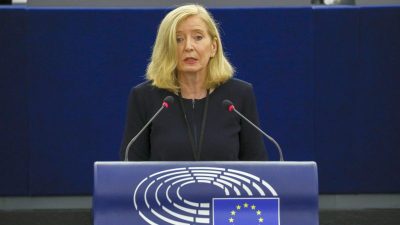Pfizer’s CEO Albert Bourla’s Text Messages with EU Commission President Ursula von de Leyen
EU Ombudsman Report

All Global Research articles can be read in 51 languages by activating the “Translate Website” drop down menu on the top banner of our home page (Desktop version).
To receive Global Research’s Daily Newsletter (selected articles), click here.
Visit and follow us on Instagram at @globalresearch_crg.
***
The European Commission’s denial of access to text messages between Commission President Ursula von der Leyen and Pfizer CEO Albert Bourla amounts to ‘maladministration’, the EU Ombudsman found.
The text messages were sent while the EU was securing COVID-19 vaccine contracts, but the Commission claimed they had not “identified” them when asked by a journalist. The New York Times first reported their existence in April 2021.
This resulted in a complaint to Ombudsman Emily O’Reilly, who made her verdict clear on Friday (28 January), stressing that the European Commission must “do a more extensive search for the relevant messages.”
“The narrow way in which this public access request was treated meant that no attempt was made to identify if any text messages existed. This falls short of reasonable expectations of transparency and administrative standards in the Commission,” O’Reilly said in a press statement.
Her report found that the search carried out by the Commission was limited to an internal record of documents where such texts would not be stored. Furthermore, it was revealed that the president’s personal office had not been asked about the messages.
She concluded that this amounted to a case of maladministration and fell far short of transparency levels expected under EU law.
Von der Leyen’s cabinet was initially asked to dig out documents fulfilling the Commission’s internal criteria for recording. According to these internal criteria, text messages are not required to be recorded along with other means of communication.
However, this was not enough to satisfy O’Reilly, who urged the Commission to change its practice.
“Not all text messages need to be recorded, but text messages clearly do fall under the EU transparency law, and so relevant text messages should be recorded,” O’Reilly pointed out, adding that it is “not credible to claim otherwise”.
The deadline for the Commission’s response to the Ombudsman is 26 April.
Many questions left unanswered
The chief Commission spokesperson, Eric Mamer, said the Commission would respond to the European Ombudsman “within the deadlines set”.
“Until such time, when we have provided our response, we will not make further comments on this topic,” he said.
Meanwhile, Commission spokesperson Johannes Bahrke added assurances that the EU executive would “investigate the issue of possible updates of our policy for providing access to documents,” adding that methods of communication are “changing across the board”.
While the Commission’s spokespeople declined further comment on the case, they reiterated that the negotiations on the vaccine contracts had happened in a formal format, in the presence of EU member states and Commission representatives.
Unclear guidelines
In November 2021, Dutch MEP Sophie in ’t Velt sent a parliamentary question to the Commission asking them to clarify the situation. The answer to her question was signed off by Commission Vice-President Věra Jourová, who is, amongst other things, responsible for work on values and transparency, including leading talks on a transparency register.
In the response, Jourová made it clear that two of the Commission’s criteria for registration were information relating “to the policies, activities or decisions falling within the institution’s sphere of responsibility” and information considered “important and not short-lived”.
The conclusion to her answer was that “due to their short-lived and ephemeral nature, text and instant messages are not meant to contain important information relating to policies, activities and decisions of the Commission.”
in ’t Velt said she was glad to see the Ombudsman’s criticisms of the Commission but nevertheless remained concerned.
“It does not often happen that you read such hard words from the EU Ombudsman,” she pointed out, adding that it “does not take a team of lawyers to assess the Commission’s reasoning for what it is: deeply flawed”.
“What worries me even more, though, is the muted response from the European Parliament. In any member state, such contempt for democratic accountability from the executive would cause an uproar,” in ’t Velt stressed in a written comment to EURACTIV.
*
Note to readers: Please click the share buttons above or below. Follow us on Instagram, @crg_globalresearch. Forward this article to your email lists. Crosspost on your blog site, internet forums. etc.
Featured image: The European Ombudsman, Emily O’Reilly, delivers a speech in the European Parliament. [ EPA-EFE/JULIEN WARNAND]

